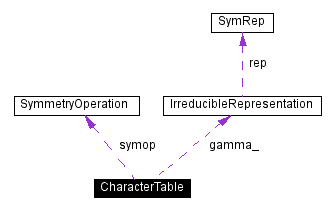
#include <pointgrp.h>
Collaboration diagram for CharacterTable:

Public Types | |
| enum | pgroups { C1, CS, CI, CN, CNV, CNH, DN, DND, DNH, SN, T, TH, TD, O, OH, IH } |
Public Methods | |
| CharacterTable () | |
| CharacterTable (const char *) | |
| This constructor takes the Schoenflies symbol of a point group as input. | |
| CharacterTable (const char *,const SymmetryOperation &) | |
| This is like the above, but it also takes a reference to a SymmetryOperation which is the frame of reference. More... | |
| CharacterTable (const CharacterTable &) | |
| ~CharacterTable () | |
| CharacterTable& | operator= (const CharacterTable &) |
| int | nirrep () const |
| Returns the number of irreps. | |
| int | order () const |
| Returns the order of the point group. | |
| const char* | symbol () const |
| Returns the Schoenflies symbol for the point group. | |
| IrreducibleRepresentation& | gamma (int i) |
| Returns the i'th irrep. | |
| SymmetryOperation& | symm_operation (int i) |
| Returns the i'th symmetry operation. | |
| int | complex () const |
| Cn, Cnh, Sn, T, and Th point groups have complex representations. More... | |
| int | inverse (int i) const |
| Returns the index of the symop which is the inverse of symop[i]. | |
| int | ncomp () const |
| int | which_irrep (int i) |
| Returns the irrep component i belongs to. | |
| int | which_comp (int i) |
| Returns which component i is. | |
| void | print (std::ostream &=ExEnv::out()) const |
| This prints the irrep to the given file, or stdout if none is given. | |
While I have tried to match the ordering in Cotton's book, I don't guarantee that it is always followed. It shouldn't matter anyway. Also note that I don't lump symmetry operations of the same class together. For example, in C3v there are two distinct C3 rotations and 3 distinct reflections, each with a separate character. Thus symop has 6 elements rather than the 3 you'll find in most published character tables.
|
|
This is like the above, but it also takes a reference to a SymmetryOperation which is the frame of reference. All symmetry operations are transformed to this frame of reference. |
|
|
Cn, Cnh, Sn, T, and Th point groups have complex representations. This function returns 1 if the point group has a complex representation, 0 otherwise. |